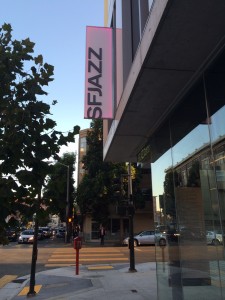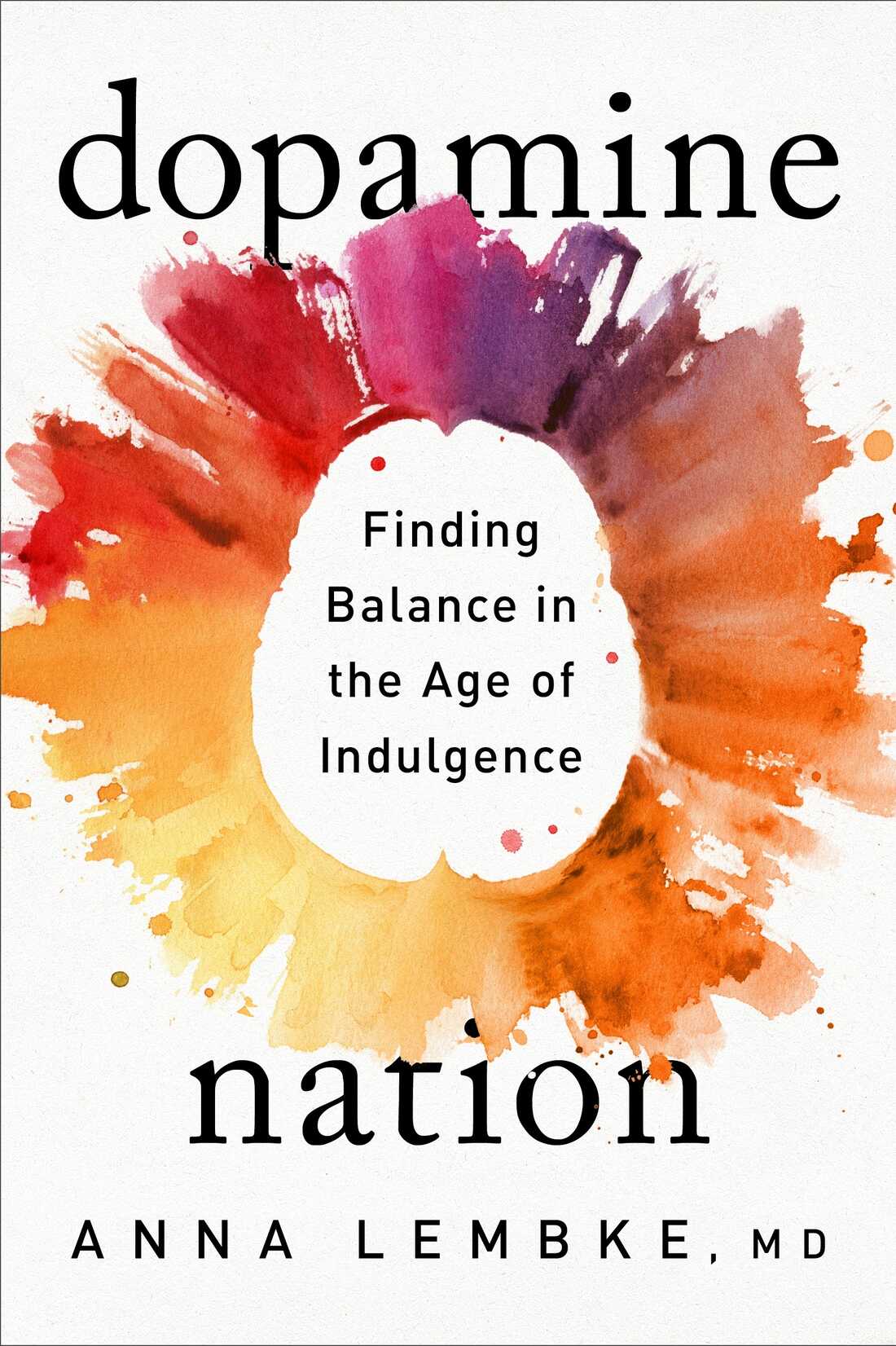
Tonight on State of the Bay at 6pm PT, we’ll discuss the neuroscience of pain, pleasure, and addiction with Dr. Anna Lembke, medical director of addiction medicine at Stanford University and author of the new book Dopamine Nation: Finding Balance in the Age of Indulgence.
Plus we’ll get an update from Joe Eskenazi, managing editor of Mission Local, on San Francisco’s broadening corruption scandal and general dysfunction.
And finally we’ll talk with SF Jazz High School All-Star Sean Huang about making music with others during a pandemic. Their new album can be found here.
Tune in tonight at 6pm PT on KALW 91.7 FM in the San Francisco Bay Area or stream live.
What would you like to ask our guests? Post a comment, tweet us @StateofBay or send an email or voicemail to StateofBay@gmail.com. You can call 866-798-TALK with questions during the show!
Jazz tenor saxophonist Joshua Redman is bringing a new level of challenge and innovation to his audience. I saw Redman and his quartet perform last week at SF Jazz, where they played songs from their new album Still Dreaming.
The quartet is made up of all-star drummer Brian Blade, cornetist Ron Miles, and bassist Scott Colley and represents a nod to Redman’s father’s quartet Old and New Dreams, a band that played from the mid-1970s to the mid-’80s, with Dewey Redman on tenor saxophone like his son.
At the heart of the music is the interplay between Redman on saxophone and Miles on cornet (basically a tiny trumpet). The two alternate among harmonizing, playing together in discordant fashion, taking turns with solo pieces and melodies, and playing simultaneously almost like two people talking past each other.
Filling in the spaces is the incredible percussion of Blade, perhaps most famous for providing the solo drum soundtrack to the Academy Award-winning movie Birdman with Michael Keaton. Colley on bass provides solid grooves, tasteful melodies, and guitar-like solos.
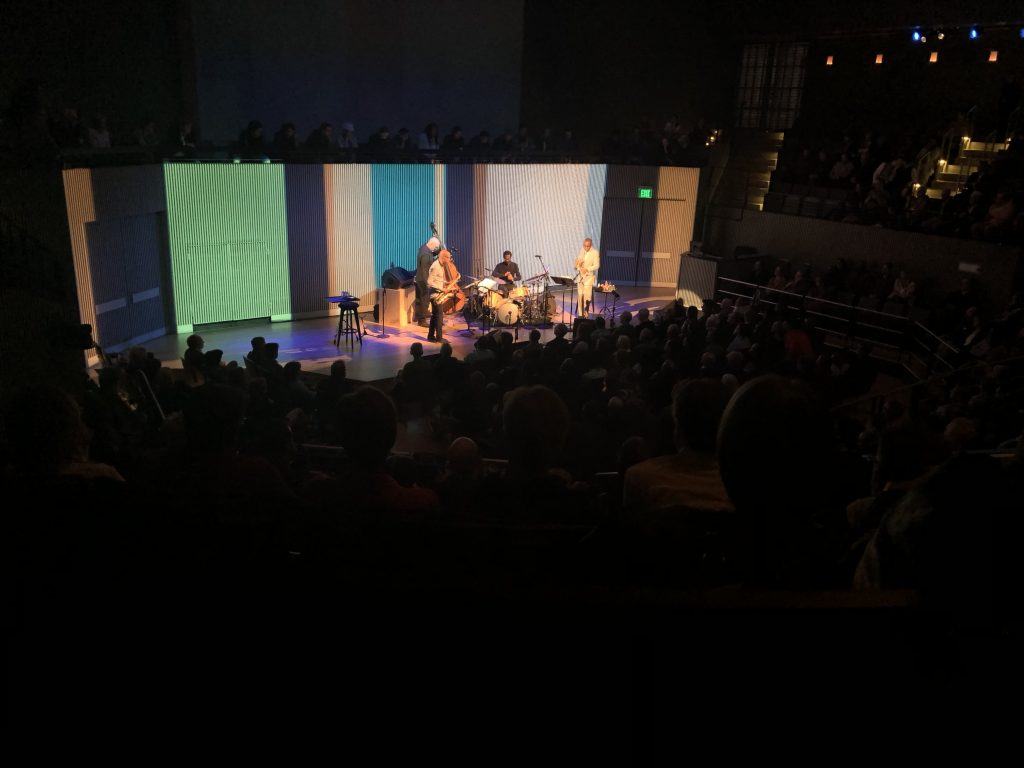 At Friday’s concert, they opened with the contemplative album-concluding track The Rest (video above), then segued into the upbeat New Year opening track. Along the way, they played Redman’s newish song “Facts” (written in January 2017 around the time of Trump’s inauguration) and Last Rites of Rock n’ Roll, a song Redman said he grew to hate performing until this new band played it. He opened that song with a long solo intro featuring circular breathing (continuous playing by breathing in through the nose while simultaneously breathing out into the horn).
At Friday’s concert, they opened with the contemplative album-concluding track The Rest (video above), then segued into the upbeat New Year opening track. Along the way, they played Redman’s newish song “Facts” (written in January 2017 around the time of Trump’s inauguration) and Last Rites of Rock n’ Roll, a song Redman said he grew to hate performing until this new band played it. He opened that song with a long solo intro featuring circular breathing (continuous playing by breathing in through the nose while simultaneously breathing out into the horn).
The band also covered Ornette Coleman’s Broken Shadows. The music overall is reminiscent of Coleman’s avant garde approach to jazz, with broken melodies and seeming off-notes, a kind of musical deconstruction. They then concluded with an encore performance of the bluesy Turnaround, from Redman’s early 1990s album Wish.
Redman’s new work and accompanying performance is not meant to get the audience toe-tapping or to revel in solo pyrotechnics. Instead, the songs are thoughtful, intellectual, and full of emotional and sonic range (particularly using quiet as a sound). It’s a challenging but enjoyable experience that stays with you long after the show ends.
For those who aren’t familiar with Brazilian music, Caetano Veloso and Gilberto Gil are like the Lennon and McCartney of the South American country. The two haven’t done a lot of formal collaboration since they burst on the scene in the 1960s, pioneering the Brazilian bossa nova pop sound of the 1960s called Tropicalia. But they are close friends and have played together since. They have also been political leaders, even to the point of being exiled in the 60s for their actions to counter Brazil’s then-dictatorship.
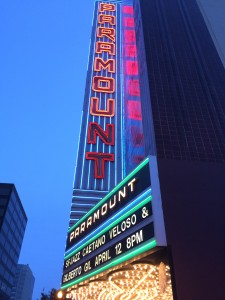 After 50 years of playing, they launched a rare world tour together which is taking them to only four U.S. cities. One of those was Oakland last night, at the Paramount Theater in the burgeoning Uptown district, put on by SF Jazz.
After 50 years of playing, they launched a rare world tour together which is taking them to only four U.S. cities. One of those was Oakland last night, at the Paramount Theater in the burgeoning Uptown district, put on by SF Jazz.
A bit about their music: while their pop stuff from the 1960s featured traditional rock ensembles, their music is mostly acoustic-guitar based, with a rhythmic foundation in bossa nova and samba that underlies everything they do. The musical elements are varied but include much 60s pop, blues, and jazz influence.
To me, Brazilian music is among the best in the world. The rhythms are sophisticated and toe-tapping, often featuring fantastic drumming and unusual meters. And the music takes the best of the jazz world, with complicated and intriguing chord progressions coupled with beautiful, catchy melodies.
And while I can’t understand most of the Portuguese words, I can think of no language more beautiful when sung. What I do understand based on my Spanish skills leads me to believe they have a lot of thoughtful and insightful lyrics as well. So all told, it’s the complete package of great music.
Veloso and Gil are now recognized as international giants of this music, so the crowd understandably went nuts went the curtain went up. The show opened with just the two of them playing acoustic guitar and singing in unison on many of the tunes on their just-released double live album recorded on this tour.
Caetano is the more cerebral of the two, and the first half of their performance transitioned to feature many of his tunes, including Tropicalia and Desde Que O Samba É Samba. Then it was Gilberto’s turn, playing many of my favorites from his class acoustic live album Acustico. Highlights included the upbeat “Expresso 2222,” “Esotérico,” and “Drão.”
The two friends definitely seemed to be enjoying themselves, with each of them even taking turns doing little jigs out front while the other played. The heavily Brazilian crowd ate it up, dancing in the aisles by the end and clapping them on to two encores. They featured a pretty version of Veloso’s Leazinho and an upbeat Filhos De Gandhi from Gil’s 1970s collaboration with songwriter/performer Jorge Ben.
The duo then closed with a poignant cover of Bob Marley’s “Three Little Birds.” With a backdrop of flags from Brazil’s states and a crowd banner protesting the political troubles going on right now in Brazil, it was hard not to think of the tune as a reassuring message to their home country (“everything little thing is going to be all right”), from two musical and political veterans who have the experience to know.
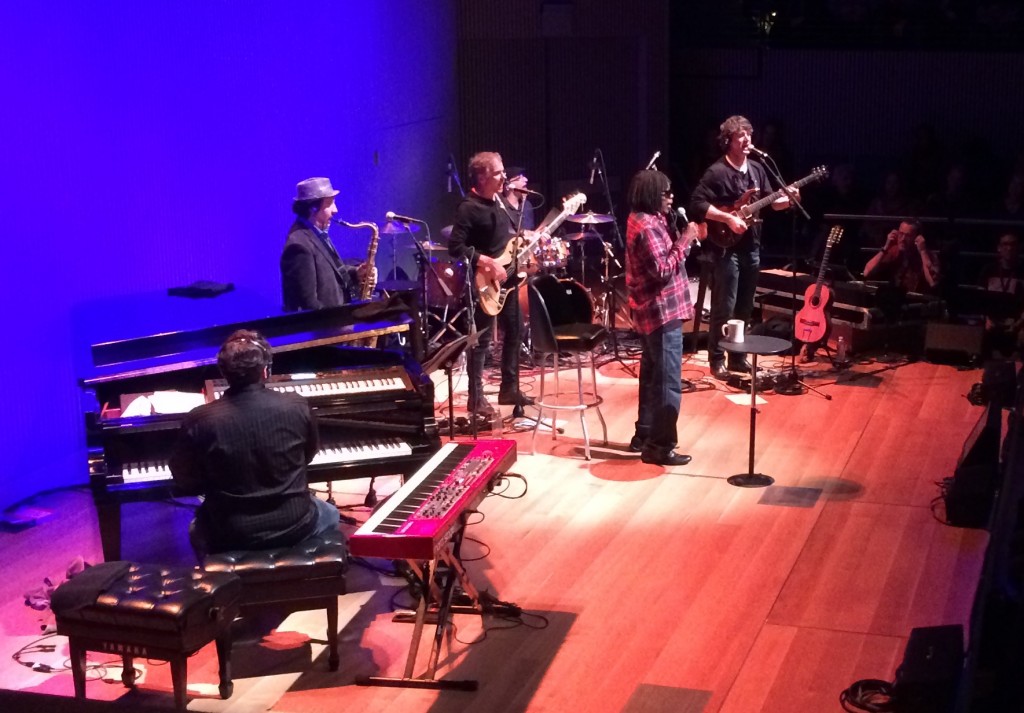 Brazilian singer-songwriter-guitarist Milton Nascimiento is truly a world music treasure. Having launched his career in the late 1960s, he was one of the first Brazilian artists to incorporate rock, jazz, funk and pop into traditional Brazilian music. His haunting falsetto, unorthodox lyrics, and awesome collaborations (Wayne Shorter, Herbie Hancock, Pat Metheny, and Paul Simon, to name a few) make some of his albums among the best worldwide (particularly Miltons).
Brazilian singer-songwriter-guitarist Milton Nascimiento is truly a world music treasure. Having launched his career in the late 1960s, he was one of the first Brazilian artists to incorporate rock, jazz, funk and pop into traditional Brazilian music. His haunting falsetto, unorthodox lyrics, and awesome collaborations (Wayne Shorter, Herbie Hancock, Pat Metheny, and Paul Simon, to name a few) make some of his albums among the best worldwide (particularly Miltons).
On Sunday night I had the pleasure to watch him and his band perform at SF Jazz. Joining Milton was an all-star cast:
-Kiko Continentino, Piano
-Widor Santiago, Sax (tenor & soprano)
-Wilson Lopes, Guitar
-Lincoln Cheib, Drums
-Gastao Villeroy, Bass
The highlight tune for me was “San Vicente,” my all-time favorite song from the album Miltons, although Kiko Continentino didn’t dare attempt to recreate Herbie Hancock’s unbelievable outro solo. He also sang a beautiful, wordless tribute to his mother in the song “Lilia” (from the album Native Dancer, a collaboration with Wayne Shorter). He got the house rocking to the catchy “Para Lennon e McCartney.” The rollicking then continued into the finale with “Maria Maria,” which got at least the Brazilians in the audience up on their feet dancing:
Overall, it was a night of high-quality music, and a chance to see a 72-year-old star far from his home while his health still allows him to travel. I’d recommend him to anyone who likes jazz and world music, particularly of the Brazilian flavor.
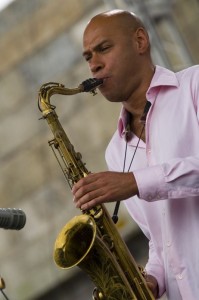 Joshua Redman is the most compelling jazz saxophonist out there, and he has been for over two decades now. The Berkeley High School and Harvard University graduate famously turned down Yale Law School to pursue a career as a musician, following in his late father Dewey’s footsteps, and society has greatly benefited from this decision. Redman brings a contemporary sensibility to jazz — exploring funk, pop, and rock through the improvisational form. He makes jazz fun, danceable, and accessible.
Joshua Redman is the most compelling jazz saxophonist out there, and he has been for over two decades now. The Berkeley High School and Harvard University graduate famously turned down Yale Law School to pursue a career as a musician, following in his late father Dewey’s footsteps, and society has greatly benefited from this decision. Redman brings a contemporary sensibility to jazz — exploring funk, pop, and rock through the improvisational form. He makes jazz fun, danceable, and accessible.
Last night I had the pleasure of attending his concert at the new-ish SF Jazz Center (more on the venue later). He played with his trio, including the world-class drummer Gregory Hutchinson and bassist Reuben Rogers. Even though the group lacked a guitar or piano player to fill in the tunes, I didn’t even notice the absence, given how the three musicians filled the space so perfectly.
He opened with a catchy funk-jazz tune called “Floppy Disk,” written by a drummer from a band that opened for the trio at a recent concert in Europe. He joked afterward about how hip the song title was, before quickly qualifying that it was true at least for “anyone over 30.” This selection previewed many of the tunes during the night, which were often covers rather than songs from his impressive roster of compositions.
He launched into “Act Natural” from his new live album of trio songs, trading fours and then ones with the drummer Hutchinson for an exciting grand finale. And then the trio mellowed the evening with the bass-heavy “Ghost” from the 2009 album “Compass.” Rogers really shined with his melodic playing and haunting groove. Redman seemed to have fun on the soprano sax for this one, ending with a series of “ghost-life” riffs like you might hear at a childhood campfire when someone is trying to scare you with eery chants.
The cover songs continued as the band played Chick Corea’s “Windows,” although the band struck me as a bit unrehearsed for this song, with the end coming a little unceremoniously. They then brought the mood back up for a few more covers, including Thelonious Monk’s “Trinkle Tinkle,” a tune Redman recorded for his first CD back in 1993. They also played Sonny Rollins’ “Pent-Up House” with a creative arrangement kept the toes tapping.
The trio featured a ballad from the new live album, “Never Let You Go,” with Redman ending his solo with some circular breathing (where you inhale and exhale at the same time to keep the continuous playing going).
One pleasant surprise from the evening included a cover of Beethoven’s second movement from his 7th Symphony (“He’ll definitely roll over on this one” Redman deadpanned). The trio jazzed the piece up but stayed true to the melancholy marching of the melody.
They left the stage, but after a standing ovation, the group came out for an encore (“Sit down!” Redman joked to laughter). They played a rousing version of “Chill” from his second album “Moodswing.”
Overall, it was a highly entertaining show, with Redman providing humorous commentary throughout. He said one benefit of being a jazz musician is that they don’t have any hits, so they can play “whatever the ‘F’ we want!” And he commented that he was happy to be at the new SF Jazz center, which is the first standalone performance center dedicated to jazz in the country. The building is the brain child of SF Jazz executive director Randall Kline, and it’s truly a remarkable venue, intimate yet sophisticated, with great acoustics.
Redman noted that it’s always a “privilege and honor” to play at SF Jazz, before saying that that’s true for about any gig they get, especially these days “where the pickings are slim” for jazz musicians. Redman is fortunate to have a steady stream of gigs, and I can’t help but think that his energy and contemporary infusion will bring new fans into the fold, benefiting the him and his fellow artists, as well as music-lovers everywhere.


